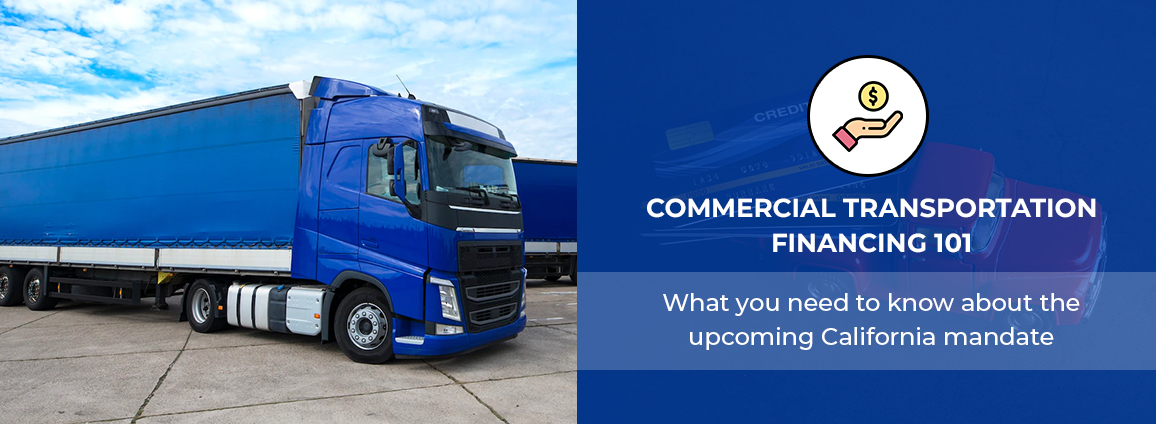Some transportation officials understand that larger trucks pose grave road threats. For this reason, the trucking industry remains under the regulation of strict state and federal laws. Our post highlights the major features of the California mandates on commercial transportation financing and more.
The OAL, or the California Office of Administrative Law, has approved the Department of Financial Protection and Innovation's proposed disclosure regulations of commercial finance. These regulations had been implemented on the disclosure requirements of commercial financing under SB 1235 (Chapter 1011, Statutes of 2018 ). As known already, in 2018, California enacted SB 1235, which involved the non-banking lenders and other financing companies in offering the finance companies into offering written, consumer-style disclosures over the few specific commercial transactions that involved small business loans as well as merchant cash advances.
Commercial transportation financing can assist business owners in buying or repairing the semi-trucks needed to make the right deliveries of transport materials or hauling goods. You can start applying for commercial transportation loans if you cannot make the right outright purchases, whether one truck suffices or you wish to establish your own smaller fleet of semi trucks.
How commercial transportation financing works
When a business owner uses their vehicle as collateral for a loan, commercial transportation financing lowers the risk for the truck lender. Similar to a car loan, the lender maintains the title to your vehicle until you pay back the debt, and if you default on your loan payments, it may seize the truck.
When seeking a commercial transportation loan, alternative lending organizations would probably provide the quickest option because the online application and approval processes are more streamlined and require less documentation than a typical bank. However, big banks frequently impose lower loan rates and demand a sizable down payment.
Features of commercial truck loans
Loans for commercial vehicles often have maturities of seven years or less. Commercial truck loan interest rates might range widely depending on the borrower's credit. Small business owners can anticipate fixed commercial transportation financing rates in the region of 5% to 8.5% if they have no credit issues, which are often no delinquencies and a score of at least 650. It will be on the low end of the scale. The more trucks you buy, the larger the loan amount. If credit issues do come up, interest rates will go higher.
Small business owners or new firms may be required to submit a personal guarantee with a simple one-page credit application when applying for commercial transportation financing, depending on how much business financial history is available. When applying for commercial transportation financing, it's best practice to have five open credit trade lines, less than forty percent revolving debt, and at least fifty percent of the loan amount installment debt history over two years old.
Who Offers Commercial Truck Financing?
Commercial financing is available from large banks, truck financing firms, and alternative lenders, although smaller regional banks may be reluctant to finance semi-truck loans, especially old or used semi-trucks. Let's take a closer look at each category of the lender.
Large National Banks
While larger national banks like Wells Fargo, CIT, Bank of America and U.S. Bank finance commercial trucks and trailers, smaller chains and local businesses typically don't want to take on the risk of doing so. They may offer long terms and affordable rates because of their resources.
Banks, however, often only approve the most qualified borrowers. Your chances of getting approved for 18-wheeler or dump truck loans are small if you have poor credit (less than 680+ FICO & Little history), low income, or no proven business experience.
Bank Requirements
Banks and credit unions have the most stringent credit requirements. To be eligible, you must have a decent or exceptional credit score. An excellent credit score, as determined by many lenders, is a 680+ FICO score, according to Experian.
Banks also prefer companies with a track record of making money, and requires at least two years in business. If your truck is really expensive they may want three to five years in business. They deal with large loans frequently, so they need to know you have the time in business and can earn enough money to repay them.
Because of this, it's a fantastic option for seasoned commercial truck owner-operators. Startup businesses and first-time truck buyers might look elsewhere to companies like Trust Capital.
Commercial Truck Finance Companies
Some lenders concentrate on financing commercial trucks. It includes a couple solely focused on financing semi-trucks and commercial trucks for trucking companies.
The commercial truck lenders are great to establish a relatinship with if you're looking to scale your trucking business and grow into a fleet of trucks. You can count on them to keep helping you approve more trucks for your business.
These truck finance firms' expertise is their key selling point. Their knowledge can help you get a good bargain on your purchase and make the transaction with the seller easier. Overall, the procedure is smoother as a result.
But certain specialty truck lenders, like those that finance trucks, might have standards you won't be able to meet if you're a startup trucking company.
Commercial transportation loan providers have their requirements for prospective borrowers. You must meet the minimum requirements set forth by the lender to be approved for a commercial car loan, which could include things like credit scores, number of open trade lines on your credit report, installment debt loan history and length of time in business.
Truck approval is far from guaranteed, even though they are less demanding than banks. Due to their extensive knowledge of the trucking industry and the volume of applications they receive, they may be less likely to approve borrowers who are less qualified.
When applying for commercial transportation financing, you should expect truck finance companies to examine the following details regarding your business and personal financial histories.
- Personal guarantees are required from every owner
- Active business entities or business licenses with the State Secretary
- A minimum credit score of 600
- No bankruptcies have been filed in the past seven years, if you have then reestablished credit is a must and be over three years old
- No unresolved liens of taxes.
- At least 5 open trade lines with at least two years of history
- At least fifty percent of the loan amount installment debt history at least two years of history
Alternative Truck Lenders
Commercial truck loans and finance for commercial truck fleets are easily accessible through alternative lenders if you have poor credit.
Business owners who frequently cannot meet the requirements of banks and certain truck lenders are given funding chances by these alternative lenders. Your commercial truck loan will probably have shorter repayment terms and higher interest rates than what you'd get with a traditional bank in exchange for having a poor credit history with healthy cash flow.
Alternative lenders provide some of the best bad credit commercial truck loans accessible if you need financing for a commercial or semi-truck with bad credit.
Alternative lenders are more likely to work with you and not disqualify you from obtaining commercial financing for bad credit or other common reasons like previously bankruptcies, outstanding judgments and large collections. It makes them an excellent option for businesses owners who are repairing their credit. By proving positive cash flow & guaranteed work a private transportation leasing company will offer you various monthly payment plans. If you have customers lined up to give you work and generate greater revenues than bad credit is not much of an issue. You will look at several leasing options from two to four years with a single payment of about 10 - 20% down. The down payments are generally negotiated and requested.
You can easily pick this option as long as you make the monthly payments and gain a return on investment, making you happier. You can use the truck lease for the use of equipment while starting to generate revenues.
Commercial Truck Sale-Leaseback
Equipment sale-leaseback would enable the businesses to cash out their commercial vehicle offering businesses better cash flow as it would help to gain numerous tax benefits.
The lender would enter into these agreements with borrowers where the borrower would get their truck leased back to them for what the trucks current value is. The equipment lease arrangements are made instantly after selling your truck to a finance company under a specified period and monthly payments.
The seller of the asset becomes the lessee, with the purchaser becoming the lessor. The agreement is highly beneficial to the trucking companies who would have to use the cash used in the commercial transportation investment to purchase other investments.
Upcoming California mandates on commercial transportation financing.
Between 2019 and 2021, California published four rounds of draft proposed regulations to collect feedback from the public on various draughts of the proposed wording (covered by InfoBytes here). The DFPI produced a final statement of reasons and the adopted regulations that list specific adjustments and details the agency's reactions to public feedback.
The following are the mandates that might get imposed:
Make it clear that a non-depository institution is not required to disclose if it provides technology or support services to a depository institution's commercial financing program. The program is not branded with a non-depository institution's trademark. The non-depository institution has no interest in or agreement to purchase any interest in the commercial financing extended by the depository institution in connection with the program.
Give specific guidelines for the content and organization of disclosures that must be delivered at the time a certain kind of commercial financing offer equal to or less than $500,000 is extended, including the rows and columns that must be used for a disclosure table and the terms that must appear in each section of the table.
Include the following commercial loan transactions in your coverage: closed-end loans, commercial open-end credit plans, factoring loans, sales- and lease-based financing, and asset-based lending. Disclosure formatting and content criteria are also included for commercial financing transactions that do not fall within the other categories.
Require disclosures to include information such as the amount financed, itemized amount financed, annual percentage rate (the regulations provide category-specific calculation instructions), finance charges (estimated and total), payment methods, such as frequency and terms for both variable and fixed rate financing, information regarding prepayment policies, and estimated loan repayment terms.
Final Thoughts on Commercial Transportation financing 101: What You Need to Know About the Upcoming California Mandate
It's time to apply once you've identified your ideal commercial transportation financing need and acquired all the required data to submit for approval.
If you apply with a bank or specialized truck lender, you must contact one of their loan professionals. Before looking more closely at your qualifications, they will review your information and pre-qualify you for commercial truck finance so you can go shopping from a private party, dealer or auction. If you're in a rush, Companies like Trust Capital would be your best option because they can approve your company in two to four hours and have the truck funded in two to three days.


 (866) 458-4777
(866) 458-4777

 Paul Kendall
Paul Kendall





